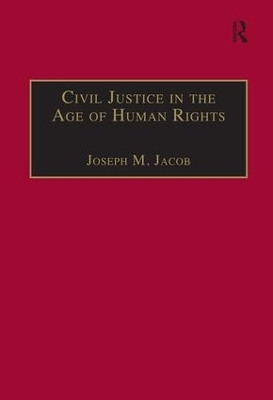
Civil Justice in the Age of Human Rights
Seiten
2007
Routledge (Verlag)
978-0-7546-4576-4 (ISBN)
Routledge (Verlag)
978-0-7546-4576-4 (ISBN)
- Titel z.Zt. nicht lieferbar
- Versandkostenfrei
- Auch auf Rechnung
- Artikel merken
Assesses the effect of the Human Rights Act (HRA) and attempts to reconcile the expediency and efficiency essential to modern civil justice with the need for recognition of human dignity and equality inherent to human rights. The book is primarily concerned with the effects of the HRA on civil procedure and, in particular, the effects on the CPR.
The end of the last century witnessed two major events in the field of civil justice: the Civil Procedure Rules (CPR) came into force and the Human Rights Act (HRA) gave effect to the European Convention on Human Rights. This volume assesses the effect of the Act and attempts to reconcile the expediency and efficiency essential to modern civil justice with the need for recognition of human dignity and equality inherent to human rights. The book is primarily concerned with the effects of the HRA on civil procedure and, in particular, the effects on the CPR. It examines the view that the new civil procedure regime could be susceptible to HRA challenges. More specifically, the work discusses whether there are differences between the CPR and the ECHR ideas of what constitutes a fair trial or just decision and between their views of proportionality. The study notes the differences between common and civil law and discusses whether there is any coming together with other European systems. This book will be a valuable resource for academics and researchers as well as lawyers and judges with an interest in the practical implications of the HRA.
The end of the last century witnessed two major events in the field of civil justice: the Civil Procedure Rules (CPR) came into force and the Human Rights Act (HRA) gave effect to the European Convention on Human Rights. This volume assesses the effect of the Act and attempts to reconcile the expediency and efficiency essential to modern civil justice with the need for recognition of human dignity and equality inherent to human rights. The book is primarily concerned with the effects of the HRA on civil procedure and, in particular, the effects on the CPR. It examines the view that the new civil procedure regime could be susceptible to HRA challenges. More specifically, the work discusses whether there are differences between the CPR and the ECHR ideas of what constitutes a fair trial or just decision and between their views of proportionality. The study notes the differences between common and civil law and discusses whether there is any coming together with other European systems. This book will be a valuable resource for academics and researchers as well as lawyers and judges with an interest in the practical implications of the HRA.
Joe Jacob is Reader in Civil Justice at the London School of Economics and Political Science, UK. He has written widely on public law and civil procedure.
Chapter 1 Introduction; Chapter 2 Open Justice; Chapter 3 Equality of Arms and Related Doctrines; Chapter 4 Disclosure and Restrictions on Evidence; Chapter 5 Impartial and Independent Judges; Chapter 6 And So?;
| Erscheint lt. Verlag | 28.1.2007 |
|---|---|
| Verlagsort | London |
| Sprache | englisch |
| Maße | 156 x 234 mm |
| Gewicht | 710 g |
| Themenwelt | Recht / Steuern ► Allgemeines / Lexika |
| Recht / Steuern ► EU / Internationales Recht | |
| Recht / Steuern ► Öffentliches Recht ► Völkerrecht | |
| Recht / Steuern ► Strafrecht | |
| Sozialwissenschaften ► Politik / Verwaltung | |
| ISBN-10 | 0-7546-4576-2 / 0754645762 |
| ISBN-13 | 978-0-7546-4576-4 / 9780754645764 |
| Zustand | Neuware |
| Informationen gemäß Produktsicherheitsverordnung (GPSR) | |
| Haben Sie eine Frage zum Produkt? |
Mehr entdecken
aus dem Bereich
aus dem Bereich


